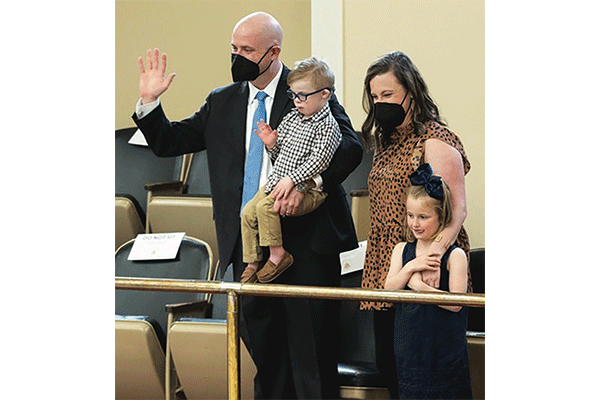Rhys and Neely Gay are being proactive in their attempt to pass a state law that would prohibit discrimination against a potential organ transplant recipient based solely on the person’s physical or mental disability.
The Gays, parents of a 3-year-old child with Down syndrome, want to ensure their son Everett will never have to face that type of discrimination if a transplant need arises. That’s the reason Senate Bill 378, otherwise known as Everett’s Law, passed 44-0 in the Senate and must now be considered in the state House.
“We approached Paul (Rosino) as a preventative measure,” Everett’s dad said. “We don’t like to leave anything to chance, and it was more about Everett’s future. As a Down syndrome child, there is a good likelihood that he’ll need a transplant later in life.”
Everett was diagnosed with Down syndrome shortly after birth and has a congenital heart defect. The 3-year-old is healthy after undergoing five surgeries. But along the way, his parents learned that individuals with mental or physical challenges could be denied a lifesaving transplant based on a disability. As a result, the Gays reached out to state Sen. Paul Rosino (R-Oklahoma City) who serves as vice chairman of the Senate Health and Human Services Committee and the Appropriations Subcommittee on Health and Human Services.
After witnessing the legislative process, the Gays are confident Everett’s Law will pass and be signed by the governor.
“Everyone we’ve met has been encouraging and the outpouring of support has been tremendous,” Rhys Gay said. “We’ve had several legislators reach out. I don’t see any reason for the winds to change. All of the issues have been addressed.”
Everett’s Law would give transplant centers and healthcare related facilities specific guidelines that everyone would have to follow.
Under SB 378, a health care provider or entity responsible for matching anatomical gift donors and recipients may not, solely based on a qualified individual’s mental or physical disability:
• Deem the person ineligible to receive an anatomical gift or organ transplant;
• Deny medical or related organ transplantation services;
• Refuse to refer the person to a transplant center or other related specialist for evaluation or organ transplantation;
• Refuse to place a person on an organ transplant waiting list;
• Place a person at a lower position on an organ transplant waiting list;
• Decline to accept insurance coverage for any procedure associated with the receipt of the anatomical gift.
The bill prohibits health insurance carriers from:
• Denying coverage solely on the basis of the disability;
• Denying a patient eligibility or continued eligibility for a health benefit plan to circumvent the requirements of the section;
• Reducing provider reimbursement or providing incentives to induce the provider to provide care in a manner inconsistent with the section;
• Limiting coverage benefits to a patient for services related to organ transplantation.
There has been no formal opposition to the measure, Rosino said. The senator said he’s certain the bill will help others in the future, but he’s unsure how many people have been discriminated against in the past.
“The Gays came to me because they wanted to be proactive instead of reactive in case Everett needed a transplant later in life and possibly face being denied because of his Down syndrome,” Rosino said. “This is a phenomenal bill and protects the rights of people.”
California was the first state to pass similar legislation in 1996. Fifteen other states have passed the antidiscrimination laws since that time. There is pending legislation in 13 other states, including Oklahoma, according to the National Down Syndrome Society.


